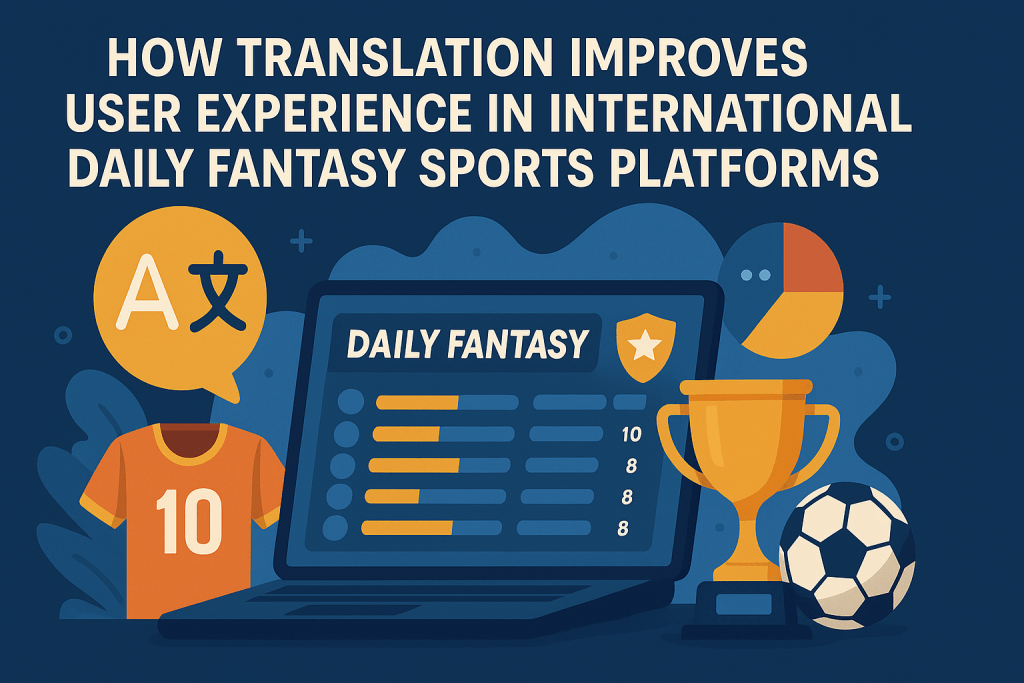As Daily Fantasy Sports (DFS) platforms like PrizePicks grow globally, reaching new users from diverse linguistic and cultural backgrounds becomes a significant challenge. One key factor that determines a platform’s success in international markets is how well it adapts to different languages and cultural norms. Translation plays a crucial role in making these platforms accessible, user-friendly, and engaging for global players. When done right, translation doesn’t just help players understand the platform—it enhances their overall experience and fosters a sense of inclusivity.
In the rapidly expanding world of DFS, a seamless experience can be a deciding factor for users to choose one platform over another. With the rise of platforms like PrizePicks offering opportunities to engage with various sports, it’s essential that these platforms offer clear, accurate translations. For example, players looking for valuable tools, such as Best NFL and Football Predictions, need to navigate the platform’s content effortlessly in their native language. This ensures they don’t miss out on strategies and promotional offers tailored to their needs.

The Importance of Clear and Accurate Translation
Accurate translation ensures that players understand the rules, instructions, and betting structures of the platform. In a market like DFS, where users need to engage quickly and make informed decisions, even minor language barriers can lead to confusion and errors. Whether it’s understanding the odds or navigating the site’s interface, unclear translations can cause frustration, reducing user satisfaction and potentially driving them to competitor platforms.
Moreover, accurate translation helps maintain consistency in user expectations. For instance, a term like “play amount” might be translated differently in various regions, and using the right terminology ensures players know exactly what their stakes are. For DFS platforms, where every detail can affect a user’s experience, localization is key to preventing misunderstandings.
Cultural Sensitivity and Relevance in Translation
While language translation is important, cultural adaptation is just as crucial. The meaning behind certain phrases, slang, or references can vary significantly across cultures. DFS platforms that cater to international markets need to go beyond mere word-for-word translations. For example, a term like “prize structure” may resonate differently in a market with particular sports preferences or local customs. Ensuring that content feels culturally relevant and relatable is a big part of making users feel at home on the platform.
By understanding cultural nuances, DFS platforms can tailor their content to appeal to users in specific regions. This includes adapting not only the language but also images, colors, and even promotional campaigns to resonate with local customs and values. Players are more likely to engage with a platform when it feels familiar and welcoming, and translation, when paired with cultural awareness, can be the key to achieving that.
Translation of Sports Terminology for Global Audiences
Another challenge for DFS platforms is the translation of sports terminology, which can be highly specialized and unique to specific regions. Sports such as American football, basketball, or soccer have different terminologies in various languages, and translating these terms without losing their meaning is critical. Whether it’s explaining “fantasy points,” “player stats,” or “play level,” DFS platforms need to ensure that users can easily grasp these concepts in their native language.
For example, a term like “lineup” in the United States might refer to a specific collection of players chosen for a DFS contest. However, in another country, the term might need further clarification or could have a different meaning altogether. Accurate translation ensures that these terms are explained clearly so that players can confidently participate in the fantasy sports experience.
Enhancing Customer Support Through Multilingual Options
One of the areas where translation directly improves user experience is in customer support. Offering multilingual support ensures that users from different countries and language backgrounds can access help when they need it. This might involve translating FAQs, live chat support, or instructional materials to ensure players get the most out of their experience without encountering language barriers.
According to a report by CSA Research, over 75% of consumers prefer buying from a website in their native language, making it crucial for businesses, especially those in DFS, to prioritize localization. For DFS platforms, where time is of the essence, offering timely and clear customer service can make a significant difference in user retention and satisfaction.
Translation Tools and AI in Modern DFS Platforms
The role of technology in translation cannot be overlooked. Many DFS platforms now use advanced AI-powered translation tools to streamline the process. These tools can provide real-time translations of content, including sports news, game statistics, and promotional offers, ensuring that international users have an up-to-date experience no matter where they are located. While AI translations still require human oversight, they have become increasingly sophisticated in providing accurate translations quickly, making them a valuable resource for global platforms.
Conclusion
As DFS platforms like PrizePicks continue to grow in popularity across the world, translating content and adapting to local languages and cultures is no longer optional—it’s essential. Proper translation enhances the user experience by providing clear instructions, adapting terminology, and supporting international players through culturally relevant content. By investing in high-quality translation and localization, DFS platforms can build trust with global audiences, ensure user satisfaction, and stay competitive in an increasingly globalized market.

